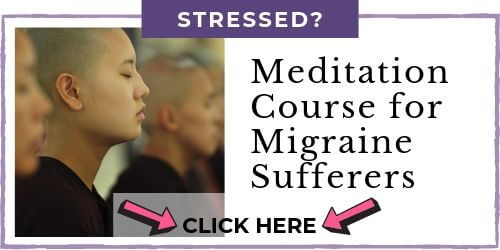- Home
- Meditation
- Will This Migraine Meditation Eliminate Your Attacks
Will This Migraine Meditation Eliminate Your Attacks?

Learning how to do this migraine meditation should help retrain and calm down your autonomic nervous system. It also induces sleep. It also has many other benefits to our overall health.
Meditation has been studied for over 40 years now and is proven to reduce the severity and duration of migraines.
It calms the autonomic nervous system and induces sleep.
Always welcome sleep if you suffer with migraines.
It is best to practice meditating at the very first warning signal of your impending attack.
However, if your migraine is coming on and the pain is becoming too intense it might be best to leave this technique for later.
Focusing on the pain instead of simply observing it can be a hard distinction if you are new to meditating.
My #1 Choice in Magnesium Supplementation
My Translation of This Technique
This technique uses a mantra. Please click here to read more about migraine meditation mantras. The mantra you choose is meant to be repeated twice every 15 seconds. This can be out loud or quietly in your mind.
It is best to find a comfortable place to sit in a comfortable position. It is preferable to sit in a quiet, calm environment. This is not always possible with migraines creating adrenaline and anxiety that can cause your mind to race off to extreme scenarios.
Sitting up is preferred to lying down, as you may have the tendency to fall asleep if you are lying down. However, falling asleep with a migraine coming is recommended.
So I suggest you lay down to do this when you have a migraine on its way, and sit for your regular practice.
Set Aside 20 Minutes Twice a Day
You may want to set aside 15-20 minutes, twice a day in your busy schedule to make time to practice. It might be helpful to allocate a special meditation space in your home and a special cushion to use only for meditation.
If you want changes to happen in your life, you will
have to make some changes.
These basic migraine meditation instructions are for you to guide yourself into the process.
To sit and prepare to start meditating, allow a few minutes to get settled in.
To end the process allow a few minutes to come out, back to reality.
Do not rush back.
Disclaimer
These are my interpretations of this meditation process. I have no affiliation, nor am I an accredited meditation teacher. If you find this to be helpful in reducing your migraine attacks (and stress), I recommend you experiment and find the best professional meditation instruction and support in your local area.
A Migraine Meditation for You to Experiment With
Here are 15 basic steps how to do this migraine meditation process.
1. Slowly close your eyes for 10 seconds.
2. Gently open your eyes for 5 seconds – check your surroundings – know you are safe (we will be repeating this).
3.
Now slowly, close your eyes again for 20 seconds. Make sure you are
sitting comfortably. If not, settle into your sitting posture until you
feel more comfortable.
4. Now gently, open the eyes for just 3 seconds.
5. And close the eyes for 30 seconds.
6. And slowly open the eyes for 5 seconds.
7.
It is not always necessary for you to do this if you are at home, but
it is a good practice to get into, to prepare yourself for the altered state
of awareness. Allow yourself to feel the silence now and breathe.
a) If you feel the silence, allow it. Welcome it.
b) If you do not feel the silence and your mind is busy bring your awareness to the breath and just take it easy. Try to relax and let your thoughts clear for a minute or so.
8. It is
time to recite your mantra for 17 and a half minutes or so. It is recommended
that you try to mentally repeat the assigned mantra twice every 15
seconds with a 15 second pause in between each repetition.
9. Slowly open your eyes for 5 seconds and feel the silence, notice if it is present.
10.
You might want to keep a journal by your side to write about the
quietness or silence you experience. You may have physical sensations
arise or feelings that come up.
Take two minutes to close and open your eyes again. So you can close your eyes gently again if you wish. Sometimes it is good to close your eyes again for one minute and when you open them again ask yourself "what did I feel? Did I feel some quietness?"
11. If your pain or physical sensation
increased you may want to continue to be with it a little longer. So
you can close your eyes for 2 minutes and allow yourself to be with the
sensation.
After 3 minutes slowly open your eyes and see if it has
eased somewhat. In the case of migraine, you may feel a significant
increase in pain or physical sensations.
Welcome Your Physical Sensations
Just notice or
allow your attention to rest on the sensations, notice if they come and
go. Notice the location in the body. Notice the intensity.
Practicing This Migraine Meditation
It is best to practice meditating at the very first sign of an attack. If your migraine is coming on and the pain is becoming too intense it might be best to leave it for later. If you are just experiencing physical sensations that are bearable it is fine to stay with them until they ease. The process of staying with the sensation should ease it.
However, some practitioners might instruct you to stay with or observe the increase and changes in intensity. It is normal for the intensity to increase when you bring awareness to your pain or sensation and it should peak and then eventually subside or disperse.
How you practice meditation with migraines then, is up to you. You can use this technique to learn about your migraines, if you can bear the intensity of the pain, or you can just observe it to where you are comfortable. Observing it neutrally and objectively is beneficial, for any amount of time you can endure.
The technique will often ease the pain. It may not eliminate the migraine, but it will calm down your autonomic nervous system and allow you to fall asleep or feel less anxious. Also, if your migraine is persistent, you may have to repeat this technique a few times through the day.
12.
Perhaps there were no physical sensations only thoughts that arose that
prevented your quietness and silence. It is ok to spend some time observing your thoughts. Could you observe your thoughts coming
and going? Did you notice the effortlessness of your thoughts coming
and going?
Welcome Your Thoughts
If your thoughts interrupt your quietness or your mantra, always
return to the mantra, but at the end of meditation allow time for your
thoughts. Allow one or two minutes to open and close your eyes, perhaps
write the thoughts down, and then hold the intention to end your
meditation.
13. It is important to note that your
thoughts come and go without any effort. Notice that the mantra also starts to become effortless and spontaneous. Notice the quietness, the silence
and the effortlessness and it will become more habitual.
14. Slowly open your eyes and end the meditation.
Good Days and Bad Days
15. If you experience difficulty with this process, know that everyone has a busy mind on some days. You will have good days and bad days.
Persevere with your meditation routine and daily practice.
You can
contact a local organization and find a teacher for more professional instruction if you find this helps reduce your migraine attacks.
End With Two Minutes of Silence
Always end your meditation with two minutes of opening and closing your eyes before you return to the business of your life.
Sleep or rest if you feel you need to.
Meditating regularly reduces stress and will free up the bodily systems for more optimal functioning.
I've recorded some guided meditations in my course, so you will get to experiment with a variety of techniques:
- Guided Meditations
- Mindfulness Meditations
- Energetic Healings
- Hypnosis
Here's the link - Meditations and Energetic Healing for Migraine Sufferers: Heal from the Inside Out
Write It Down
This is not normally recommended with regular meditation practice, however, I prefer to always have a pen and paper ready or a journal to write down what arises.
Try not to analyze anything, just write and allow whatever comes up to have its own space. Make sure you write down what felt important or what you might want to take action on.
I find that the intense pain with migraines can bring up a lot of emotions, and find this extra bit that I like to add to my practice using this migraine meditation, very beneficial.
Meditation can morph into any number of lessons. Let your new found inner quietness be your teacher, friend and your guide. Allow yourself the space twice each day, to clear your mind and find your center.
Your body and migraine brain will love you for it.
You can check out my migraine meditations course here...
Ready to take the next step?
Choose the next step that fits where you are right now.
MIGRAINE MEDITATIONS Related Articles
References for Migraine Meditation:
1. Doughney, Mike (2012) Section 1 – 3: Checking Notes. [Online], Available at: http://minet.org/checktoc.html Accessed May 25, 2012.
2. Perkins, C (2012) Mindfulness Over Migraines. Cynthia Perkins Self Published: USA.
3. Hazen, H (2013) Adaptation of How to Do A Migraine Meditation.















